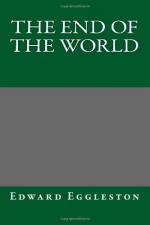To this picturesque structure, half castle, half cabin, with hints of church and temple, came August Wehle on Saturday evening. He did not go round to the portico and knock at the front-door as a stranger would have done, but in behind the donjon chimney he pulled an alarm-cord. Immediately the head of Andrew Anderson was thrust out of a Gothic hole—you could not call it a window. His uncut hair, rather darker than auburn, fell down to his waist, and his shaggy red beard lay upon his bosom. Instead of a coat he wore that unique garment of linsey-woolsey known in the West as wa’mus (warm us?), a sort of over-shirt. He was forty-five, but there were streaks of gray in his hair and board, and he looked older by ten years.
“What ho, good friend? Is that you?” he cried. “Come up, and right welcome!” For his language was as archaic and perhaps as incongruous as his architecture. And then throwing out of the window a rope-ladder, he called out again, “Ascend! ascend! my brave young friend!”
And young Wehle climbed up the ladder into the large upper room. For it was one peculiarity of the castle that the upper part had no visible communication with the lower. Except August, and now and then a literary stranger, no one but the owner was ever admitted to the upper story of the house, and the neighbors, who always had access to the lower rooms, regarded the upper part of the castle with mysterious awe. August was often plied with questions about it, but he always answered simply that he didn’t think Mr. Anderson would like to have it talked about. For the owner there must have been some inside mode of access to the second story, but he did not choose to let even August know of any other way than that by the rope-ladder, and the few strangers who came to see his books were taken in by the same drawbridge.
[Illustration: THE CASTLE.]
The room was filled with books arranged after whimsical associations. One set of cases, for instance, was called the Academy, and into these he only admitted the masters, following the guidance of his own eccentric judgment quite as much as he followed traditional estimate. Homer, Virgil, Dante, and Milton of course had undisputed possession of the department devoted to the “Kings of Epic,” as he styled them. Sophocles, Calderon, Corneille, and Shakespeare were all that he admitted to his list of “Kings of Tragedy.” Lope he rejected on literary grounds, and Goethe because he thought his moral tendency bad. He rejected Rabelais from his chief humorists, but accepted Cervantes, Le Sage, Moliere, Swift, Hood, and the then fresh Pickwick of Boz. To these he added the Georgia Scenes of Mr. Longstreet, insisting that they were quite equal to Don Quixote. I can only stop to mention one other department in his Academy. One case was devoted to the “Best Stories,” and an admirable set they were! I wish that anything of mine were worthy to go into such company. His purity of feeling, almost ascetic, led him to




